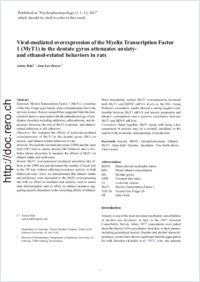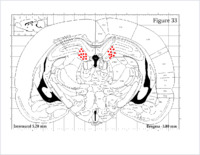Viral-mediated overexpression of the Myelin Transcription Factor 1 (MyT1) in the dentate gyrus attenuates anxiety- and ethanol-related behaviors in rats
- Bahi, Amine Department of Anatomy, Tawam Medical CampusUnited Arab Emirates UniversityAl AinUAE
- Dreyer, Jean-Luc Division of Biochemistry, Department of Medicine, University of Fribourg, Switzerland
-
16.03.2017
Published in:
- Psychopharmacology. - 2017, p. 1–12
English
Myelin Transcription Factor 1 (MyT1), a member of the Zinc Finger gene family, plays a fundamental role in the nervous system. Recent research has suggested that this transcription factor is associated with the pathophysiology of psychiatric disorders including addiction, schizophrenia, and depression. However, the role of MyT1 in anxiety- and ethanol-related behaviors is still unknown.Objectives: We evaluated the effects of lentiviral-mediated overexpression of MyT1 in the dentate gyrus (DG) on anxiety- and ethanol-related behaviors in rats.Methods: We used the elevated plus maze (EPM) and the open field (OF) tests to assess anxiety-like behavior and a two- bottle choice procedure to measure the effects of MyT1 on ethanol intake and preference.Results: MyT1 overexpression produced anxiolytic-like effects in the EPM test and decreased the number of fecal boli in the OF test, without affecting locomotor activity in both behavioral tests. Next, we demonstrated that ethanol intake and preference were decreased in the MyT1-overexpressing rats with no effect on saccharin and quinine, used to assess taste discrimination, and no effect on ethanol clearance suggesting specific alterations in the rewarding effects of ethanol. Most importantly, ectopic MyT1 overexpression increased both MyT1 and BDNF mRNA levels in the DG. Using Pearson’s correlation, results showed a strong negative relationship between MyT1 mRNA and anxiety parameters and ethanol consumption and a positive correlation between MyT1 and BDNF mRNAs.Conclusion: Taken together, MyT1 along with being a key component in anxiety may be a suitable candidate in the search of the molecular underpinnings of alcoholism.
- Faculty
- Faculté des sciences et de médecine
- Department
- Département de Médecine
- Language
-
- English
- Classification
- Biological sciences
- License
-
License undefined
- Identifiers
-
- RERO DOC 288526
- DOI 10.1007/s00213-017-4588-7
- Persistent URL
- https://folia.unifr.ch/unifr/documents/305383
Other files
Statistics
Document views: 97
File downloads:
- pdf: 196
- Supplementary material: 70

